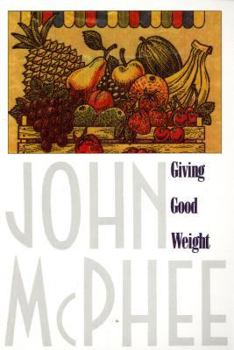Giving Good Weight
Select Format
Select Condition 
Book Overview
"You people come into the market--the Greenmarket, in the open air under the down pouring sun--and you slit the tomatoes with your fingernails. With your thumbs, you excavate the cheese. You choose your stringbeans one at a time. You pulp the nectarines and rape the sweet corn. You are something wonderful, you are--people of the city--and we, who are almost without exception strangers here, are as absorbed with you as you seem to be with the numbers...
Format:Paperback
Language:English
ISBN:0374516006
ISBN13:9780374516000
Release Date:April 1994
Publisher:Farrar, Straus and Giroux
Length:272 Pages
Weight:0.78 lbs.
Dimensions:0.7" x 5.5" x 8.1"
Customer Reviews
4 ratings
A gift
Published by Thriftbooks.com User , 18 years ago
For its story of Otto alone, this book is a treasure. Every lover of wonderful storytelling/reportage/writing should read this. As McPhee might, I will say nothing more-except to apologize, because he would express that sentiment more artfully. Here's hoping there are a couple more McPhee's coming along.
If only life was like a box full of McPhee essays
Published by Thriftbooks.com User , 22 years ago
All sorts of tasty satisfaction, with something of interest for all tastes. John McPhee is a master of the literate essay. He seeks out topics that most of us would never think to be interested in, and makes them available to us. Best of all, McPhee always remembers that it isn't just the technical details of a subject that are interesting, but the people. His essays can be found first in the pages of "New Yorker" magazine, but then usually make it out in book form quickly.In "Giving Good Weight", McPhee serves up five splendid examples of the essayist's art. First, the title essay, about the produce sellers of the open-air farmer's market, the Brooklyn Greenmarket. McPhee interviewed, and sacked produce for, several of the sellers. His specialty, green peppers. He follows the sellers back to their farms, tracking the greens from seed to sale.What if you had a dream of how to produce electricity cleanly, out-of-sight, and still be competitive? That's what Richard Eckert, subject of the second essay, 'The Atlantic Generating Station' had. McPhee focuses on Eckert and the other dreamers involved, but along the way gives us lots of information about oceangraphy, marine biology, the electrical utility industry, and nuclear regualation.'Pinball Philosphy' is about the two best pinball players in New York City, at a time (1975) when public pinball was illegal there. We learn about the machines, the sub culture that saw pinball play as their life and work as the finacing mechanism to supply quarters, and tricks of play. Then, McPhee puts Tony Lukas and Tom Buckley head-to-head for play on a Williams Fun-Fest machine. Only the best flipper can win.Next, we join McPhee and some cronies for canoeing in Maine, mostly on the St. John River, in 'The Keel of Lake Dickey'. McPhee's first mass market bestseller was his Alaskan classic "Coming into the Country" and in this essay he shows yet again his love and feel for nature.The last, and best, essay in the book is 'Brigade de Cuisine'. This is about a restaurant, it's one man kitchen crew Chef "Otto" (hence the title), and his family. In the essay, McPhee never identifies 'Otto', the name of the restaurant, or even it's location. This caused quite a fuss with the professional food critics of New York when the essay was published in the 'New Yorker', as they couldn't believe that such a place could exist. In time they found the place, and did their best to destroy it, out of sheer pique. Fortunately, 'Otto' already had plans to move out West and open a new place. It would be fun if McPhee would write a sequel to 'Brigade' and tell us his view of all the fuss. Oh, for anyone who has read the essay, and might be interested to know, 'Otto's real name is Alan Lieb, and his restaurant was in Shohola. PA.
McPhee's best volume of "assortments"
Published by Thriftbooks.com User , 22 years ago
John McPhee is, by universal agreement, our greatest non-fiction writer. Although his single-focus books about geology and Alaska are the foundation of his reputation, I find this varied collection of shorter pieces to be the most enjoyable reading. My particular favorite is "Brigade de Cuisine" which details the single-minded dedication of a chef/owner to expressing himself in food. Mouth-watering stuff.(A background story to illustrate the politics of the food world: The chef, who asked McPhee not to identify him, was quoted in the piece as saying that the famous Andre Soltner of Lutece used frozen shrimp in one of his dishes. The outraged Soltner demanded a retraction and McPhee, for perhaps the only time in his career, grudgingly complied. Rallying behind Soltner, its favored son, The New York Times dispatched a reporter to learn the chef's identity. Having done so, they printed a scathing review of his restaurant - one that is hard to reconcile with McPhee's rapturous descriptions of its food. The proof would be in the pudding, so to speak, but this sure sounds like a vendetta to me.)
Intelligent, humerous and painless reading
Published by Thriftbooks.com User , 27 years ago
This is the first John McPhee book I ever read -- back when it first came out -- and I still recall it with pleasure. The subject matter is eclectic, the writing so seamless and flowing that you really don't notice that McPhee does write wonderful prose. This is pure pleasure reading -- along the way, you'll learn quite a bit, but McPhee is sneaky. You don't even realize you're being educated. Like E.B. White? Like intelligent, creative essays? You'll like this book, one of my favorite McPhees....




